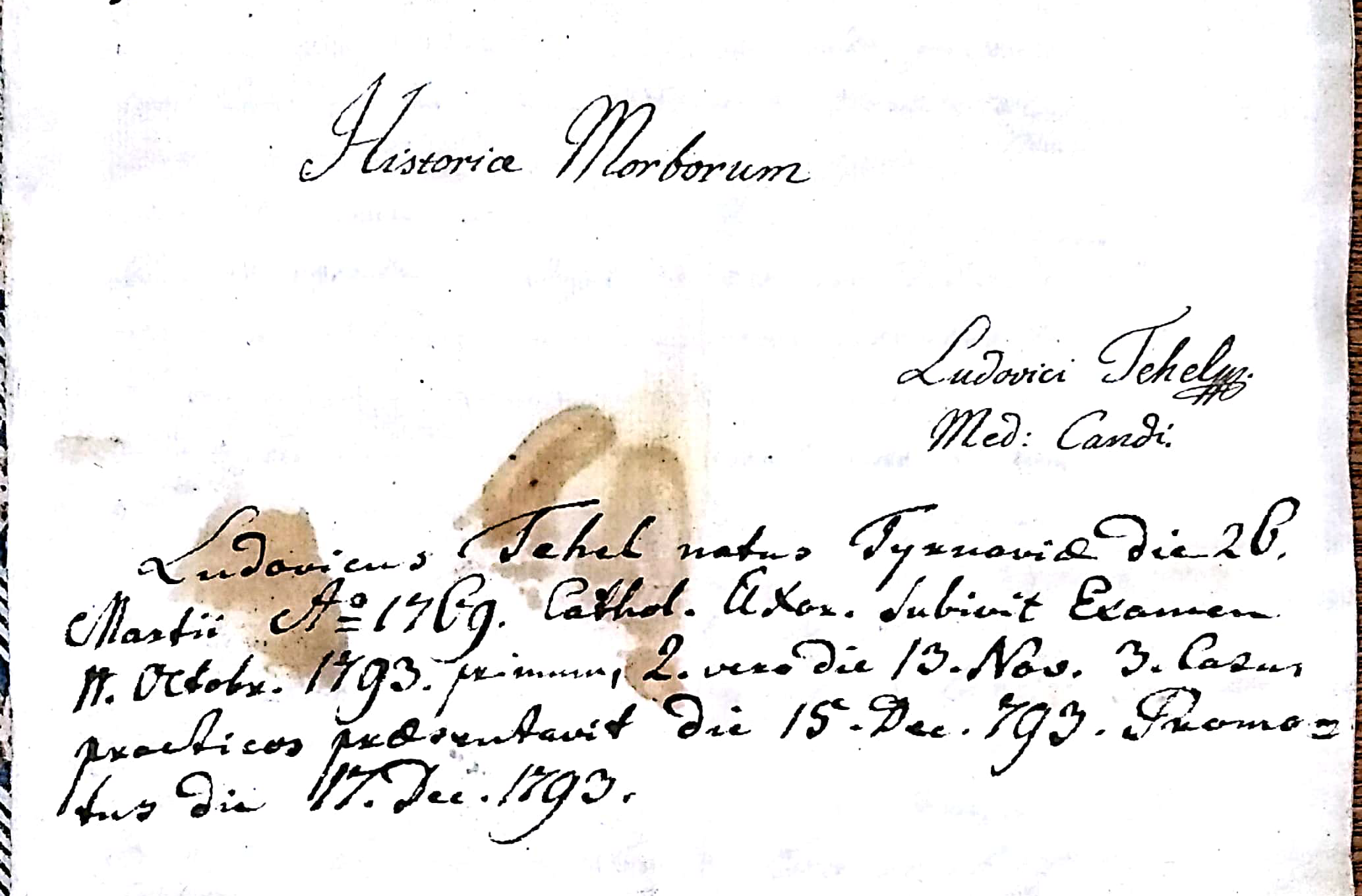A test vagy a lélek betegsége?
Elmebetegség-értelmezések a pesti egyetemi klinika kórtörténeteiben a 19. század elején
DOI:
https://doi.org/10.15170/PAAA.2022.09.02.05.Kulcsszavak:
pszichiátria, kórtörténet, klinika, egyetem, tébolydaAbsztrakt
A pesti egyetem klinikájára a 19. század elejétől fokozatosan egyre több, az elmebetegség valamely típusával diagnosztizált páciens került be, ahol a klinikai gyakorlatukat teljesítő orvostanhallgatók részletes és szigorú narratív struktúrába rendezett esetleírásokban, kórtörténetekben és klinikai naplókban örökítették meg a betegségek lefolyását és a páciensek gyógyulás felé vezető útját. A hazai orvostörténet-írásban eddig szinte teljes egészében figyelmen kívül hagyott kórtörténeteket vizsgálva szembetűnő, különösen, ha összehasonlítjuk őket egyéb intézményekben keletkezett esetleírásokkal és terápiás gyakorlatokkal (például a Habsburg Birodalom korai tébolydáival, az edinburgh-i egyetem hasonló rendszerben működő poliklinikájával vagy a tébolydák ideáltípusának tekintett York Retreat eseteivel), hogy a pesti klinikai gyakorlatban a 18–19. század fordulóján az orvosi irodalomban lelki- és elmebetegségként számon tartott állapotok még mindig elsősorban a test, és nem a lélek betegségeiként értelmeződtek. A tanulmány a diagnosztika, az elmebetegség-értelmezések és a pszichologizált nézőpont érvényesítésének határait és limitjeit vizsgálja, valamint egy több szempontból marginalizált réteg a társadalomban elfoglalt helyének kijelölésére irányuló törekvéseket (elzárás, büntetés, hospitalizáció/institucionalizáció) is, amelyek a magyar kontextusban elsősorban a sajátos intézményi háttér, az orvosi oktatás tartalma és a domináns terápiás gyakorlatok, valamint az egyszerre adminisztratív és interpretatív műfajként is értelmezhető kórtörténet-írás összefüggéseinek feltárásával érthetők meg.
Letöltések
Hivatkozások
Aaslestad, Petter: The Patient as Text: The Role of the Narrator in Psychiatric Notes, 1890–1990. Oxford, 2009.
Andrews, Jonathan: Case Notes, Case Histories, and the Patient’s Experience of Insanity at Gartnavel Royal Asylum, Glasgow, in the Nineteenth Century. Social History of Medicine 11. (1998):2. 255–281. ǁ [DOI] https://doi.org/10.1093/shm/11.2.255 ǁ [Google Scholar] https://tinyurl.com/yw3bh4td
Andrews, Jonathan – Scull, Andrew: Customers and Patrons of the Mad-Trade: The Management of Lunacy in Eighteenth-Century London, With the Complete Text of John Monro’s 1766 Case Book. Berkeley – Los Angeles – London, 2002.
Bacopoulos-Viau, Alexandra – Fauvel, Aude: The Patient’s Turn. Roy Porter and Psychiatry’s Tales, Thirty Years On. Medical History 60. (2016):1. 1–18. ǁ [DOI] https://doi.org/10.1017/mdh.2015.65 ǁ [Google Scholar] https://tinyurl.com/475k68hu
Little Tools of Knowledge: Historical Essays on Academic and Bureaucratic Practices. Eds. Becker, Peter – Clark, William. Ann Arbor, 2001.
Berkenkotter, Carol: Patient Tales. Case Histories and the Uses of Narrative in Psychiatry. Columbia, 2008.
Blair, Ann: Reading Strategies for Coping with Information Overload, ca. 1550–1700. Journal of the History of Ideas 64. (2003):1. 11–28. ǁ [DOI] https://doi.org/10.1353/jhi.2003.0014 ǁ [Google Scholar] https://tinyurl.com/76uffxuc
Borgos Anna: A megtestesült trauma. Hisztériás betegek huszadik század eleji kórrajzok tükrében. In: Határtalan nők. Kizártak és befogadottak a női társadalomban. Szerk. Bakó Boglárka – Tóth Eszter Zsófia. Budapest, 2008. 382–393.
Condrau, Flurin: The Patient’s View Meets the Clinical Gaze. Social History of Medicine 20. (2007):3. 525–540. ǁ [DOI] https://doi.org/10.1093/shm/hkm076 ǁ [Google Scholar] https://tinyurl.com/26fvtraa
Craig, Stephen C.: “Enquire into All the Circumstances of the Patient Narrowly”: John Rutherford’s Clinical Lectures in Edinburgh, 1749–1753. Journal of the History of Medicine and Allied Sciences 72. (2017):3. 302–327. ǁ [DOI] https://doi.org/10.1093/jhmas/jrx017 ǁ [Google Scholar] https://tinyurl.com/y322hwwz
Daston, Lorraine: Taking Note(s). Isis 95. (2004):3. 443–448. ǁ [DOI] https://doi.org/10.1086/428963 ǁ [Google Scholar] https://tinyurl.com/5fpe72dx
Daston, Lorraine: The Empire of Observation. In: Histories of Scientific Observation. Eds. Daston, Lorraine – Lunbeck, Elizabeth. Chicago, 2011. 82–113. ǁ [DOI] https://doi.org/10.7208/chicago/9780226136790.001.0001 ǁ [Google Scholar] https://tinyurl.com/yeywj7nm
Digby, Anne: Madness, Morality and Medicine: A Study of the York Retreat, 1796–1914. New York, 1985. [Google Scholar] https://tinyurl.com/4svr4wyy
Foucault, Michel: A pszichiátriai hatalom: a kikérdezés, a drog és a hipnózis (1974. január 31-i előadás a Collège de France-ban). Ford. Takács Ádám. In: Drogpolitika, hatalomgyakorlás és társadalmi közeg. Elemzések foucault-i perspektívából. Szerk. Rácz József – Takács Ádám. Budapest, 2006. 145–161.
Frank Tibor: A pszichiátriai kórrajz mint történeti forrás. Világosság 19. (1978):4. 239–247.
Geyer-Kordesch, Johanna: Comparative Difficulties: Scottish Medical Education in the European Context (c. 1690–1830). In: The History of Medical Education in Britain. Eds. Nutton, Vivian – Porter, Roy. Amsterdam – Atlanta 1995. 94–115. ǁ [DOI] https://doi.org/10.1163/9789004418394_008 ǁ [Google Scholar] https://tinyurl.com/29nzfuem
Goody, Jack: The Logic of Writing and the Organisation of Society. Cambridge, 1986. ǁ [DOI] https://doi.org/10.1017/CBO9780511621598 ǁ [Google Scholar] https://tinyurl.com/2f4y2djm
Gyáni Gábor: A pszichohistória-írás magyar fejleményei. In: Aranyhíd. Tanulmányok Keszeg Vilmos tiszteletére. Szerk. Jakab Albert Zsolt – Vajda András. Kolozsvár, 2017. 135–144.
Patient Voices in Britain, 1840–1948. Eds. Hanley, Anne – Meyer, Jessica. Manchester, 2021.
Hess, Volker: Formalisierte Beobachtung. Die Genese der modernen Krankenakte am Beispiel der Berliner und Pariser Medizin (1725–1830). Medizinhistorisches Journal 45. (2010):3–4. 293–340. ǁ [DOI] https://doi.org/10.25162/medhist-2010-0011 ǁ [Google Scholar] https://tinyurl.com/2fdw6m6j
Hess, Volker – Ledebur, Sophie: Taking and Keeping: A Note on the Emergence and Function of Hospital Patient Records. Journal of the Society of Archivists 32. (2011):1. 21–33. ǁ [Google Scholar] https://tinyurl.com/yc4w9e4d ǁ [WoS] https://www.webofscience.com/wos/woscc/full-record/WOS:000293452200003
Hess, Volker – Mendelsohn, Andrew J.: Case and Series: Medical Knowledge and Paper Technology, 1600–1900. History of Science 48. (2010):3–4. 287–314. ǁ [DOI] https://doi.org/10.1177/007327531004800302 ǁ [Google Scholar] https://tinyurl.com/26cya3f2 ǁ [WoS] https://www.webofscience.com/wos/woscc/full-record/WOS:000281824800002
Hurwitz, Brian: Form and Representation in Clinical Case Reports. Literature and Medicine 25. (2006):2. 216–240. ǁ [DOI] https://doi.org/10.1353/lm.2007.0006 ǁ [Google Scholar] https://tinyurl.com/4dn8kfxc
Ingram, Allen: The Madhouse of Language: Writing and Reading Madness in the Eighteenth Century. London, 1991. ǁ [Google Scholar] https://tinyurl.com/pb3tcs98
Kennedy, Margaret Ann: A Curious Literature: Reading the Medical Case History from the Royal Society to Freud. PhD thesis. Brown University, 2000.
Kovai Melinda: Politika, hatalom és tudás a Kádár-korszak pszichiátriai kórrajzain. Doktori értekezés, Pécsi Tudományegyetem, 2010. (https://pea.lib.pte.hu/bitstream/handle/pea/15219/kovai-melinda-phd-2011.pdf?sequence=1&isAllowed=y) [2022.03.30.] ǁ [Google Scholar] https://tinyurl.com/3t3thnp9
Kövér György: Hysteriától a tébolyodottságig. Klára és Emma párhuzamos esettörténete. Korall 21–22. (2005):2. 68–96.
Krász Lilla: Az adatoktól az információig, az információtól a tudástermelésig: Az egészségügyijelentés-írás gyakorlata(i) a XVIII. századi Magyarországon. Századvég 70. (2013) 155–187.
Krász Lilla: Theoria medica és praxis medica: A tudásközvetítés változó útjai a medicinában a 18. század második felében. Századok 151. (2017):5. 1025–1042.
Krász Lilla: Táblázatokba zárt tudás? Az orvosi tudásszervezés gyakorlatai a 18. századi Magyarországon. Kaleidoscope 13. (2018) 223–250. ǁ [Google Scholar] https://tinyurl.com/2n2hkndb
Krász Lilla: ’Observing to describe, describing to observe’: The Epistemic Turn of Medical Writing in the 18th Century. Hungarian Studies 33. (2019) 175–184. ǁ [DOI] https://doi.org/10.1556/044.2019.33.1.12 ǁ [Google Scholar] https://tinyurl.com/27fhpa4t
Lafferton Emese: A magántébolydától az egyetemi klinikáig. A magyar pszichiátria történetének vázlata európai kontextusban, 1850–1906. In: A kreativitás mintázatai. Szerk. Békés Vera. Budapest, 2004. 34–72.
Lafferton Emese: Halált hozó hipnózis. Egy 1894-es eset és a tudomány mentális földrajza. Korall 21–22. (2005):2. 46–67.
Mendelsohn, Andrew J.: Empiricism in the Library. In: Science in the Archives: Pasts, Presents, Futures. Ed. Daston, Lorraine. Chicago, 2017. 85–109. ǁ [DOI] https://doi.org/10.7208/chicago/9780226432533.003.0003 ǁ [Google Scholar] https://tinyurl.com/m7n73zur
Montgomery Hunter, Kathryn: Doctor’s Stories: The Narrative Structure of Medical Knowledge. Princeton, 1991. ǁ [DOI] https://doi.org/10.1515/9780691214726
Pomata, Gianna: Sharing Cases: The Observationes in Early Modern Medicine. Early Science and Medicine 15. (2010):3. 193–236. ǁ [DOI] https://doi.org/10.1163/157338210X493932 ǁ [Google Scholar] https://tinyurl.com/ufu5s2m6
Porter, Roy: The Patient’s View. Doing Medical History from Below. Theory and Society 14. (1985): 2. 175–98. ǁ [DOI] https://doi.org/10.1007/BF00157532 ǁ [Google Scholar] https://tinyurl.com/yc23zxwz
Rédei Ildikó: Historiae morborum: Kórtörténetek a 18–19. századból. Budapest, 2016.
Reaume, Geoffrey: From the Perspectives of Mad People. In: The Routledge History of Mental Health. Ed. EGHIGIAN, Greg. London, 2017. 277–296. ǁ [DOI] https://doi.org/10.4324/9781315202211-16 ǁ [Google Scholar] https://tinyurl.com/3w9kdd7b
Risse Guenter B.: Hospital Life in Enlightenment Scotland: Care and Teaching at the Royal Infirmary of Edinburgh. Cambridge, 1986. ǁ [Google Scholar] https://tinyurl.com/5yhusxe6
Risse, Guenter B.: Clinical Instruction in Hospitals: The Boerhaavian Tradition in Leyden, Edinburgh, Vienna and Pavia. Clio Medica 21. (1987):1–4. 1–19. ǁ [DOI] https://doi.org/10.1163/9789004418301_003 ǁ [Google Scholar] https://tinyurl.com/bddcj5zr
Scheutz, Martin – Weiss, Alfred Stefan: Spitäler im bayerischen 2008 und österreichischen Raum in der Frühen Neuzeit (bis 1800). In: Europäisches Spitalwesen. Institutionelle Fürsorge in Mittelalter und Früher Neuzeit / Hospitals and Institutional Care in Medieval and Early Modern Europe. Eds./Hg. Scheutz, Martin – Sommerlechner, Andrea – Weigl, Herwig – Weiss, Alfred Stefan. Wien – München, 2008. 185–229. ǁ [DOI] https://doi.org/10.7767/boehlau.9783205160885.185 ǁ [Google Scholar] https://tinyurl.com/ymcx6n4s
Watzka, Carlos: Vom Hospital zum Krankenhaus: zum Umgang mit psychisch und somatisch Kranken im frühneuzeitlichen Europa. Köln – Wien, 2005. ǁ [Google Scholar] https://tinyurl.com/38xr337d
Watzka, Carlos: Arme, Kranke, Verrückte: Hospitäler und Krankenhäuser in der Steiermark vom 16. bis zum 18. Jahrhundert und ihre Bedeutung für den Umgang mit psychisch Kranken. Graz, 2007. ǁ [Google Scholar] https://tinyurl.com/sx6f8nzc

Downloads
Megjelent
Hogyan kell idézni
Folyóirat szám
Rovat
License
Copyright (c) 2023 Per Aspera ad Astra

This work is licensed under a Creative Commons Attribution-NonCommercial-NoDerivatives 4.0 International License.










